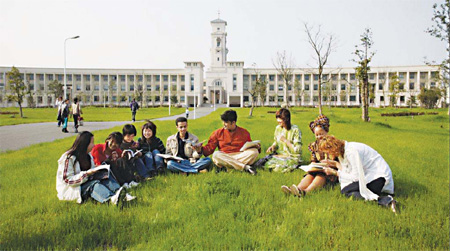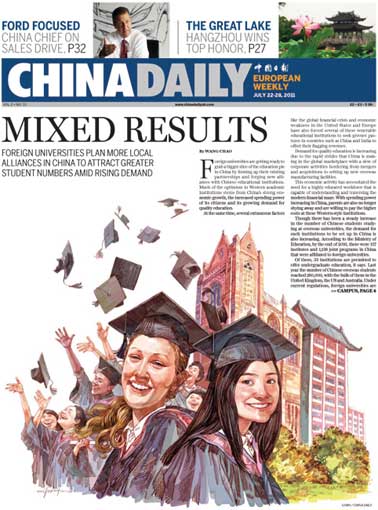Mixed Results
Updated: 2011-07-22 10:56
By Wang Chao (China Daily European Weekly)
|

The campus of the University of Nottingham Ningbo, the first "hybrid" university in China which was set up in 2004. [Provided to China Daily]
|
"Introducing foreign schools can have a domino effect - as it can bring in new curriculum, new faculty, new ideas and new systems, and eventually lead to a profound reform in the education arena," Chu says.
Discontent with the current educational system in China has increased in recent times, particularly against the outdated curriculum, lack of classroom interaction and the rigid university admission system that is reliant on the gaokao (national college entrance examination) rankings. Such measures have often led to an outflow of talent, prompting calls for education reforms. In 2003, the Ministry of Education came out with regulations on Sino-foreign academic programs, paving the way for what experts call the "education gold rush".
Over the next few years, several influential Western schools set up shop in China. Notable among them were University of Nottingham in Ningbo in East China's Zhejiang province with the Wanli education group; and University of Liverpool in Suzhou in East China's Jiangsu province, with Xi'an Jiaotong University.
Last year, the Ministry of Education came out with clearer guidelines for foreign universities. In July it issued the educational plan for the next decade, wherein it vowed to get first-class institutes and scholars to come to China, as well as to reform the current higher education system.
In March this year, the ministry received 161 applications to start joint programs, compared with 90 for all of 2010. While some of the programs involved an independent university granting diplomas under its own name, in other cases it involved joint programs affiliated to a Chinese university.
Making waves
It was New York University (NYU) that grabbed eyeballs in May this year when, after several months of intense speculation, it decided to build a campus in Shanghai in association with East China Normal University. The Shanghai campus is the second such campus set up by NYU after a similar one in Abu Dhabi last year.
"Shanghai is a good destination for us. The city is emerging quickly as a new financial center in Asia with an annual GDP of 1.69 trillion yuan (180 billion euros), and its financial services are expanding at an exponential rate. There will be a thirst for the talent that NYU will produce," says NYU President John Sexton, adding that it expects to start its all-discipline school by 2013.
Compared with NYU, other US institutions such as Duke University have adopted a tentative and cautious approach in China. Duke has teamed up with the Kunshan city government to set up a campus that will offer master of business administration courses soon but has not committed itself to future expansion.
The NYU plans to build a downtown complex in Shanghai that will function as classrooms, libraries and other public areas. It will be in the midst of headquarters of banks and financial institutions. NYU rejected the proposal to build a larger campus in suburban areas, and chose to rather stay in downtown Shanghai, to "better interact with the city".
Yu Lizhong, president of East China Normal University, says that the institute will admit more than 3,000 undergraduate and graduate students every year, with the majority being Chinese. All the students will also have the opportunity to study abroad for at least one semester, Yu says. Sexton says the Shanghai campus is a stepping-stone leading to a "global network university" which will eventually cover six continents.
However, every "portal" has to be self-sufficient, with no funds being spared from the parent institution. In Shanghai's case, the funding will come from local government support, tuition fees and donations.
E-paper

The perfect cut
Companies need to revamp, standardize to stave off quality challenges
Crowning achievement
Living happily ever after
Let there be smell
Specials

My China story
Foreign readers are invited to share your China stories.

90th anniversary of the CPC
The Party has been leading the country and people to prosperity.

Setting the pace in Turkey
China is building a 158-km high-speed railway in Turkey.
